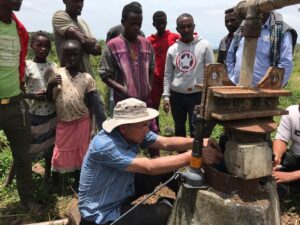A new opportunity for RPCVs to help deliver clean water, sanitation and hygiene to rural communities
by Mary Ostrowski

A WEFTA worker and local partners troubleshoot a groundwater well
that provides water to Bachuma Hospital in West Omo Zone, Ethiopia.
Most people in the developed world would agree with the statement “Water is life.” After all, our hands, lips, food, clothing, and household surfaces come in contact with clean, safe water multiple times a day. How could we exist without it and still be healthy enough to maintain our daily activities? We couldn’t. Most of us have never needed to try. Poor-quality water equates to a suboptimal life, one at significant risk of poor health, poverty, and hopelessness. Water Engineers for the Americas and Africa (WEFTA) is intent on reducing that risk by working with rural and Indigenous com- munities to implement sustainable water, sanitation, and hygiene (WASH) projects where they are needed. WEFTA heartily welcomes Returned Peace Corps Volunteers to our ranks.
In collaboration with NPCA’s new Continuation of Service program, WEFTA is expanding its ability to assist rural communities with their water, sanitation, and hygiene needs by involving and supporting Returned Peace Corps Volunteers in WEFTA projects. In some cases, new WEFTA volunteers are picking up precisely where they left off as Peace Corps Volunteers. For example, a Peace Corps project in Panama that was suspended during the COVID-19 pandemic has been resumed with funding from WEFTA. One particularly dedicated volunteer had the satisfaction of supplying technical assistance to a rural community first with Peace Corps, pre-pandemic, and then with WEFTA, post-pandemic. This sort of seamless transition between organizations goes a long way toward efficient progress in satisfying global water, sanitation, and hygiene needs while also meeting the goals of Peace Corps to promote peace and understanding worldwide.
When water services are lacking, women and girls may be the biggest losers. A new report issued by UNICEF and the World Health Organization explores how insufficient access to safely managed drinking water and sanitation disproportionately affects women and girls. That’s because females are primarily responsible for domestic chores in many parts of the world.
The work we do must be sustainable, not just a series of short-term fixes. That’s why WEFTA involves the community in every project. We find that community buy-in is critical to the success of a project, and that communities are enthusiastic about participating. Initiatives such as the WASH Circuit Rider Program help ensure the availability of ongoing technical support as needed. This program involves recurring follow-up visits by experts, called “circuit riders,” who travel to communities with WASH installations. Circuit riders periodically monitor these installations and provide on-the-job training.
According to UNICEF and the World Health Organization, the percentage of the global population using safely managed drinking water services now stands at 73 percent, up from 69 percent in 2015. Safely managed drinking water is defined by the UN as drinking water from an improved water source that is located on the premises, available when needed, and free from fecal and priority chemical contaminants. Populations in urban areas have greater access to these services: 81 percent versus 62 percent of rural populations.
In all, 2.2 billion people, approximately one in four individuals globally, lack access to safely managed drinking water. Although there has been definite progress toward universal access to safely managed drinking water by 2030 (the UN’s Sustainable Development Goal 6), the UN estimates that a sixfold increase in the current rate of progress is needed to meet the goal. A sixfold increase may be an unrealistic expectation, but through their ongoing efforts, WEFTA, Peace Corps, and other kindred organizations will continue to chip away at the many burdens associated with the lack of safely managed drinking water, sanitation, and hygiene infrastructure.
WEFTA is proud to welcome Returned Peace Corps Volunteers through NPCA’s new Continuation of Service program to keep advancing the challenging goals ahead of us.
Mary Ostrowski is a WEFTA volunteer. Those interested in learning more can reach out through NPCA’s GivePulse page.
